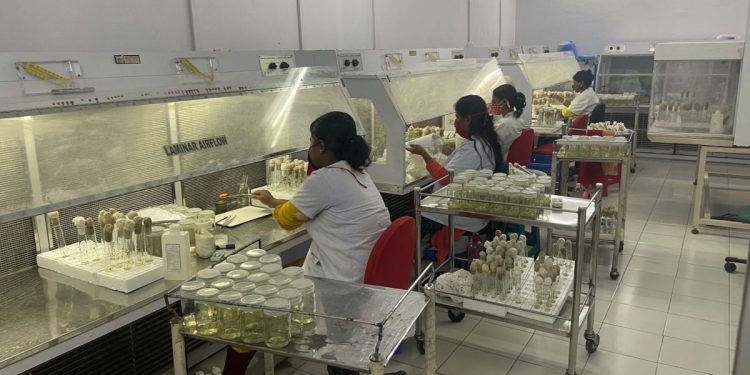#TripuraPotatoRevolution #TissueCultureLab #PotatoSeedProduction #ARCSeedlings #AgriculturalInnovation
Discover the groundbreaking work happening at the tissue culture laboratory in Agartala, Tripura, where the Department of Horticulture (DoH) lab staff, trained by the CIP team, is rapidly multiplying tissue culture plantlets of popular potato varieties. Learn about their recent success in producing an astounding 27,000 plantlets within a month and their plans to establish a temperature-controlled polyhouse for apical-rooted cuttings (ARC) production. This article delves into the potential consequences of this development and its significance for Tripura’s potato industry.
The tissue culture laboratory in Agartala, Tripura, has become a hub of innovation and progress in the field of potato plant production. Under the guidance of the CIP team, the Department of Horticulture (DoH) lab staff has received specialized training in multiplying tissue culture plantlets of popular potato varieties, such as Jyoti, Himalini, Uday, and Megha. This collaboration has yielded remarkable results, with an impressive production of 27,000 plantlets achieved within just one month.
Excitement is in the air as the DoH takes another ambitious step forward. They are currently in the process of establishing a temperature-controlled polyhouse, which is set to commence apical-rooted cuttings (ARC) production from August onwards. The goal is to produce a staggering 500,000 ARCs and subsequently plant them in farmers’ fields for G0 production.
This development carries significant implications for Tripura’s potato industry. As the only state in India still producing True Potato Seed (TPS) introduced by the CIP over 30 years ago, Tripura has the opportunity to revolutionize its approach to potato seed production. Successful ARC seed production could lead to a shift in focus towards this more efficient and reliable method. The implications are far-reaching, potentially improving the quality and yield of potato crops in the region.
The successful implementation of tissue culture techniques and the subsequent establishment of a temperature-controlled polyhouse for ARC production hold immense promise for Tripura’s potato industry. By producing a larger quantity of disease-free and genetically uniform plantlets, farmers will have access to high-quality planting material. This, in turn, can lead to improved crop yield, reduced production costs, and increased profitability for farmers.
Furthermore, the adoption of ARC seed production can address several challenges faced by the traditional TPS method. ARC seedlings are apical-rooted, ensuring better root development and enhanced resistance to diseases and pests. Additionally, these seedlings have a reduced growth cycle, allowing for faster multiplication and earlier planting. By harnessing these advantages, Tripura can achieve higher productivity and secure a more sustainable potato industry.
The ongoing advancements in tissue culture and ARC seed production in Tripura highlight the state’s commitment to agricultural innovation. This impressive initiative not only serves as a model for other regions but also demonstrates the potential of collaboration between research institutions, government bodies, and local farmers.







